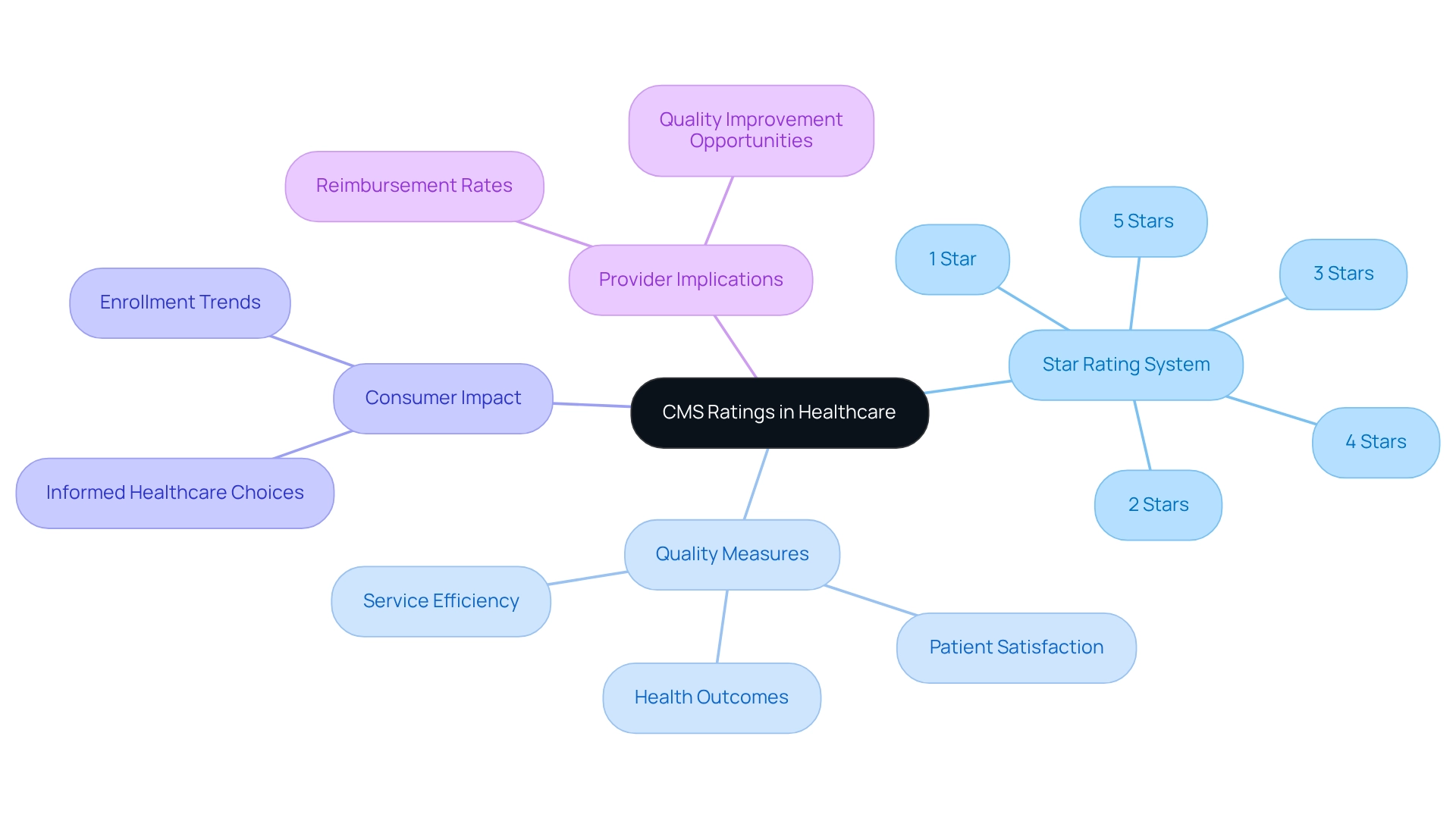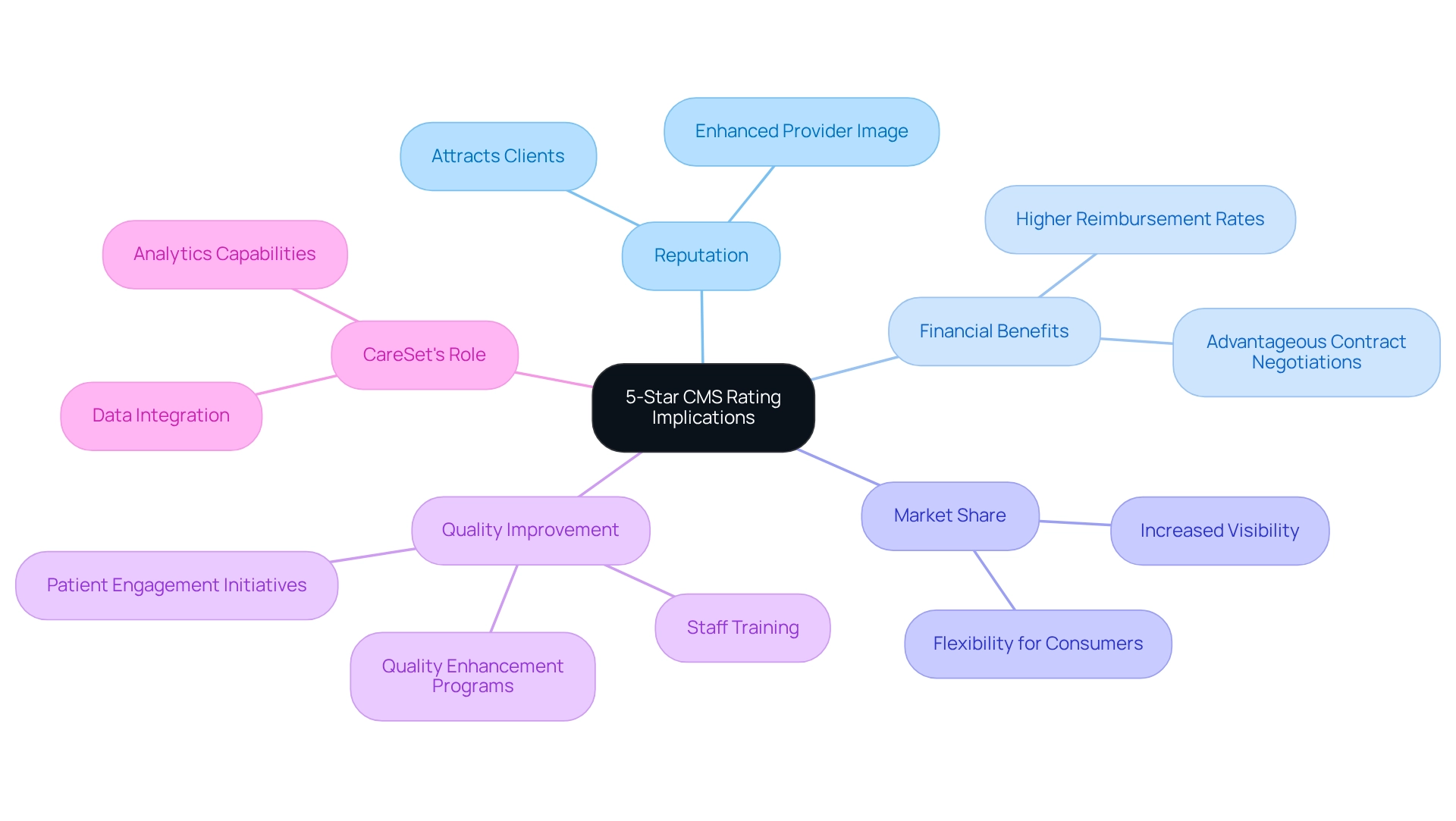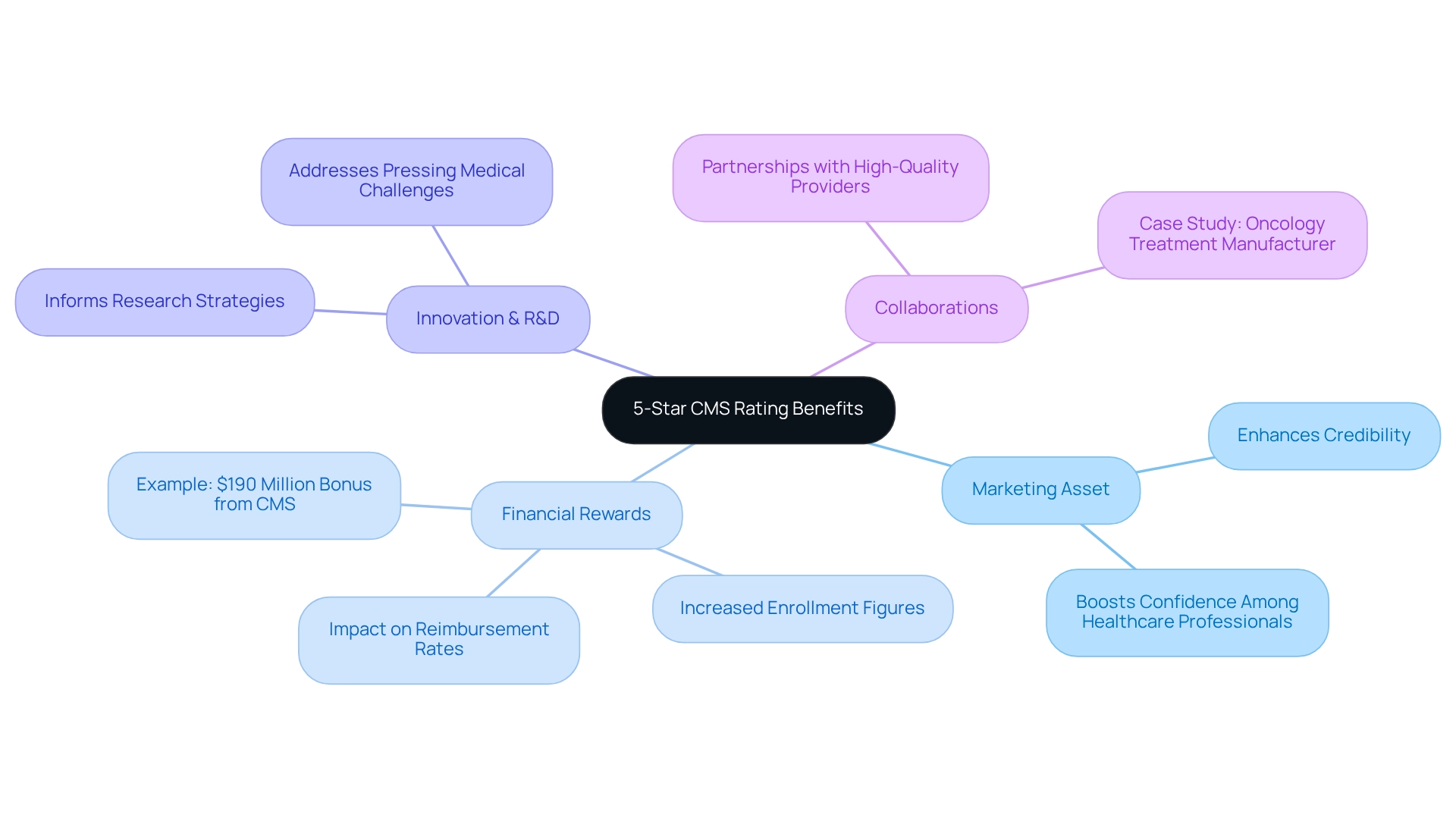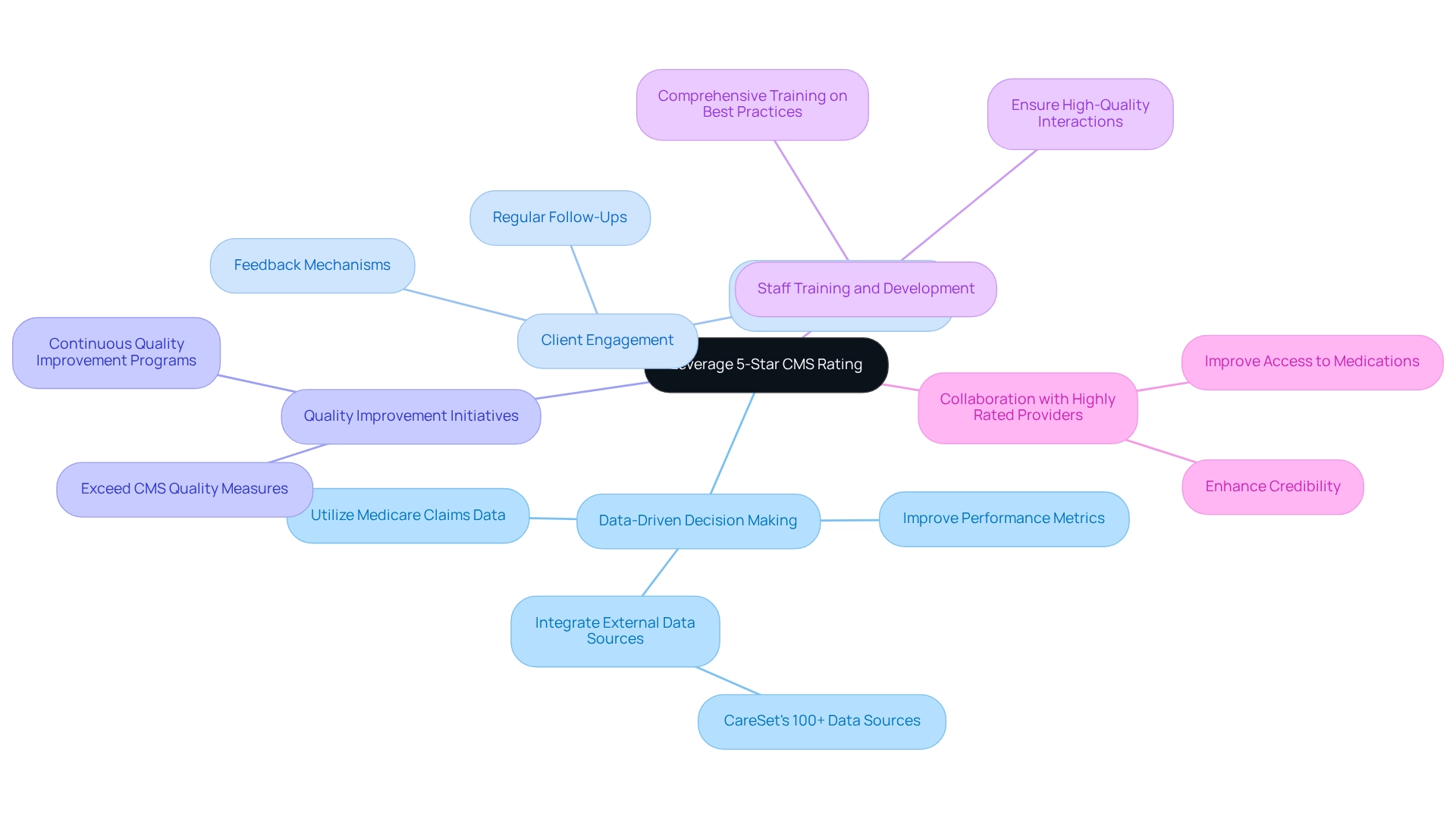Overview
The article elucidates how attaining a 5-star CMS rating can unlock significant strategic advantages for healthcare providers and pharmaceutical companies. This achievement not only enhances reputation but also attracts a greater number of patients and improves reimbursement rates. Evidence supports that higher ratings correlate with increased enrollment in Medicare plans and financial benefits. This underscores the critical importance of delivering quality care and implementing continuous improvement strategies to sustain such ratings in an increasingly competitive healthcare landscape. Engaging with CareSet’s insights can further empower organizations to navigate these challenges effectively.
Introduction
In the intricate landscape of healthcare, the Centers for Medicare & Medicaid Services (CMS) Five-Star Quality Rating System serves as a crucial reference point for both providers and consumers. This rating system evaluates the performance of Medicare health plans and providers, significantly influencing consumer decision-making. With ratings grounded in vital metrics such as patient satisfaction and health outcomes, the ramifications of attaining a high star rating are substantial.
For healthcare providers, achieving a 5-star rating can result in increased patient enrollment and improved reimbursement rates. Additionally, pharmaceutical companies can capitalize on these ratings to bolster their market credibility and cultivate strategic partnerships. As the healthcare environment continues to evolve, grasping and leveraging the significance of CMS ratings becomes imperative for all stakeholders committed to enhancing care quality and achieving business success.
Define CMS Ratings and Their Importance in Healthcare
The Centers for Medicare & Medicaid Services (CMS) uses a 5 star cms rating system to evaluate and compare the performance of Medicare health plans and providers. This system is vital for consumers, empowering them to make informed healthcare choices. Ratings are based on various quality measures, including patient satisfaction, health outcomes, and service efficiency. Notably, each star evaluation related to heart conditions carries a weight of three times, except for the SPC, underscoring the importance of these metrics in assessing care quality.
A higher star score, often associated with a 5 star cms rating, indicates superior quality of care, which can lead to increased enrollment in Medicare health plans and improved reimbursement rates for providers. Recent adjustments to the Hold Harmless provision, now applicable solely to five-star plans, reflect CMS’s acknowledgment that even high-performing plans have opportunities for enhancement. This change is anticipated to yield significant Medicare savings while fostering competition among esteemed plans to maintain their standings.
As Kerry Larkey noted, “The score can’t exceed 5 stars or drop below 1 star,” emphasizing the structured nature of the evaluation system. Understanding the implications of these evaluations is essential for stakeholders aiming to improve care for individuals and refine their strategic initiatives within the medical sector. CareSet’s comprehensive Medicare data insights empower medical stakeholders by addressing critical inquiries such as network affiliations, treatment pathways, and individual journey insights. The CMS Five-Star Quality Assessment System, which provides a 5 star cms rating, not only serves as a benchmark for quality but also influences consumer medical decisions, as evidenced by the correlation between star scores and enrollment trends in Medicare health plans. With the significance of these evaluations continuing to rise as of 2025, it becomes imperative for medical professionals and organizations to leverage this information to enhance their service offerings and client engagement strategies. Furthermore, CMS will recommence assessments of nursing homes’ Health Inspection and Quality Measure scores, further highlighting the ongoing importance of the evaluation system.

Analyze the Implications of a 5-Star CMS Rating for Providers
Achieving a 5 star cms rating significantly enhances the reputation of healthcare providers, making them more appealing to prospective clients who regard these evaluations as vital in their healthcare decisions. Providers with superior evaluations not only attract a larger patient base but also benefit from higher reimbursement rates from Medicare, supported by an extensive analysis derived from over 100 external data sources integrated by CareSet. This wealth of data provides a clearer understanding of the financial implications associated with high evaluations, and a 5 star CMS rating fosters more advantageous contract negotiations with insurers while increasing visibility in a competitive marketplace.
The financial repercussions of maintaining a 5 star cms rating are substantial. Providers may witness a considerable rise in market share, as consumers can switch to a Medicare Advantage plan with a 5 star cms rating at any time. This flexibility allows these plans to attract new individuals throughout the year, as highlighted in the case study ‘Putting Individuals First: Unlocking Medicare Data to Empower HCP,’ which illustrates how timely engagement with healthcare providers regarding treatment options can lead to enhanced financial stability and growth.
Nevertheless, maintaining a 5 star cms rating requires a continuous commitment to quality improvement and care practices, which can be resource-intensive. Providers are required to invest in staff training, patient engagement initiatives, and quality enhancement programs to ensure they adhere to the stringent standards essential for such evaluations.
CareSet’s comprehensive data solutions and analytics capabilities are instrumental in aiding healthcare professionals in navigating these challenges, empowering them to make informed decisions that elevate both the quality of care and financial performance. As the healthcare landscape increasingly prioritizes quality and value-driven care, star evaluations emerge as a pivotal factor in shaping the financial success of practitioners.

Explore Strategic Benefits of a 5-Star Rating for Pharmaceutical Companies
A 5 star CMS rating stands as a formidable marketing asset for pharmaceutical companies, significantly enhancing the credibility of their products. Such evaluations not only bolster confidence among healthcare professionals but also facilitate collaborations with esteemed facilities, which are more inclined to prescribe their medications. By leveraging these evaluations in conjunction with CareSet’s extensive Medicare data insights, companies can pinpoint gaps in care and tailor their services to more effectively address individual needs, ultimately yielding enhanced outcomes—an essential component of value-based care models.
Furthermore, a strategic partnership with high-quality providers can yield substantial advantages. For instance, organizations that attain higher adherence scores receive financial rewards from CMS, as these metrics directly impact reimbursement rates and enrollment figures. This connection is crucial; improved adherence scores not only enhance care for individuals but also strengthen the financial sustainability of pharmaceutical firms. In March 2024, CMS’s reevaluation of Elevance’s contract ratings resulted in an additional $190 million bonus payout, underscoring the significant financial implications of maintaining high ratings in a competitive environment.
Pharmaceutical companies can also utilize CMS ratings data, enriched by CareSet’s insights, to inform their research and development strategies, ensuring that their products address the most pressing medical challenges. Collaborations between pharmaceutical companies and top-rated medical professionals can lead to innovative solutions that enhance care and drive market success. For example, the case study of an oncology treatment manufacturer illustrates how the application of CareSet’s data insights can improve interactions with medical professionals regarding treatment options, ultimately leading to better patient outcomes.
Moreover, CareSet’s new data science offerings provide sophisticated tools that can assist pharmaceutical firms in refining their drug launch plans and optimizing their overall market strategies. In conclusion, a 5-star CMS rating not only enhances marketing strategies but also fosters beneficial collaborations with top-rated healthcare providers, ultimately positioning pharmaceutical companies for sustained success in a competitive healthcare landscape. To discover how CareSet’s comprehensive data solutions can empower your business, let’s initiate a conversation today.

Implement Strategies to Leverage a 5-Star CMS Rating
To effectively leverage a 5 star cms rating, stakeholders should concentrate on several pivotal strategies.
-
Data-Driven Decision Making: Utilize Medicare claims data to identify areas for improvement in healthcare and operational efficiency. This approach is supported by evidence showing that organizations utilizing data-driven strategies can significantly improve their performance metrics. CareSet’s monthly Medicare updates provide novel insights into drug utilization and treatment pathways, integrating more than 100 external data sources to offer a comprehensive foundation for informed decision-making.
-
Client Engagement: Develop initiatives that promote client communication and satisfaction, such as regular follow-ups and feedback mechanisms. Effective engagement initiatives have been demonstrated to improve CMS ratings by ensuring that individuals’ needs are met and addressed promptly. CareSet’s insights into individual navigation from diagnosis to treatment can further empower these initiatives. As Vicky Mahn-DiNicola, Vice President of Clinical Analytics and Research, states, “You receive one consultant that you can call anytime with questions or concerns,” highlighting the support available for implementing these strategies.
-
Quality Improvement Initiatives: Implement continuous quality improvement programs aimed at not only meeting but exceeding CMS quality measures. These initiatives can lead to improved outcomes for individuals and higher satisfaction scores.
-
Staff Training and Development: Invest in comprehensive training for staff on best practices in care and service delivery, ensuring high-quality interactions that contribute to positive experiences.
-
Collaboration with Highly Rated Providers: Form alliances with medical providers who have attained high scores to enhance credibility and improve access to medications.
By adopting these strategies, stakeholders can not only attain a 5 star cms rating but also maintain it over time, resulting in improved patient outcomes and enhanced competitiveness in the market. Furthermore, current trends in adopting a data-driven mindset in the medical field, such as eliminating data silos and developing standards and governance, are essential for fostering a culture of continuous improvement. The commitment to a data-driven process, supported by CareSet’s comprehensive Medicare data insights, can yield benefits across all departments in healthcare organizations, ultimately enhancing overall performance.

Conclusion
The CMS Five-Star Quality Rating System serves as a critical benchmark in the healthcare landscape, evaluating the performance of Medicare health plans and providers. This system empowers consumers to make informed healthcare choices and significantly impacts the operational and financial success of healthcare organizations. A high star rating can lead to increased patient enrollment, enhanced reimbursement rates, and improved market competitiveness, highlighting the importance of quality metrics such as patient satisfaction and health outcomes.
For healthcare providers, the journey to securing and maintaining a 5-star rating demands a steadfast commitment to quality improvement and patient care. It involves investing in staff training, patient engagement initiatives, and continuous quality enhancement programs. Furthermore, the strategic advantages extend beyond providers to pharmaceutical companies, where high ratings bolster market credibility and foster beneficial partnerships with top-rated healthcare facilities. This symbiotic relationship ultimately contributes to better patient outcomes and drives financial success in a value-based care environment.
As the healthcare industry continues to evolve, leveraging insights derived from CMS ratings becomes increasingly critical for all stakeholders. By adopting data-driven strategies, fostering patient engagement, and collaborating with high-rated providers, organizations can achieve a 5-star rating and ensure its sustainability over time. The implications of these ratings are profound, shaping consumer choices and influencing the broader healthcare ecosystem. Embracing the significance of the CMS Five-Star Quality Rating System is essential for those committed to enhancing care quality and achieving lasting success in a competitive marketplace.


